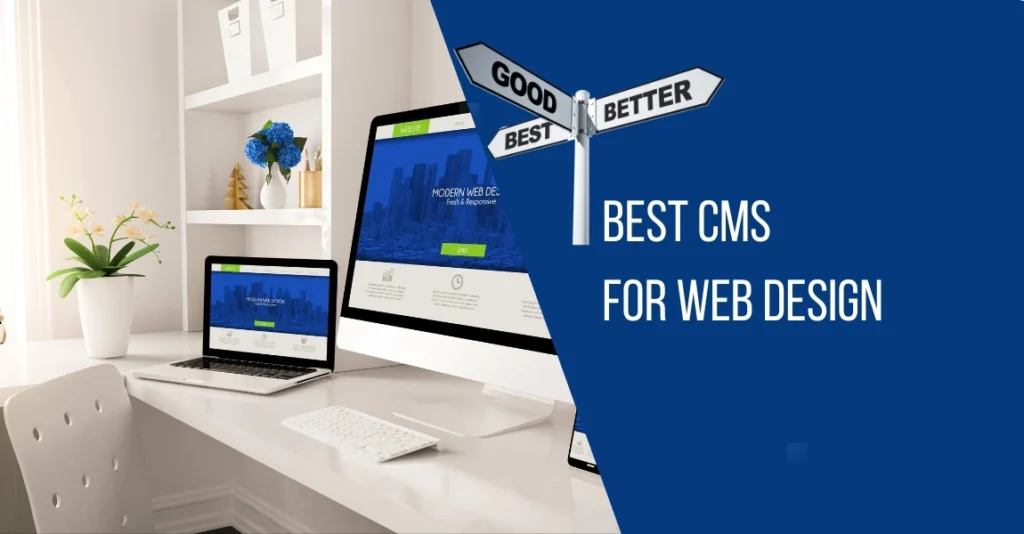Choosing the right content management system (CMS) for web design is crucial for businesses, bloggers, and e-commerce owners. A CMS allows users to create, manage, and modify website content without needing extensive coding knowledge. With so many options available, it can be difficult to decide which one is best suited for your needs.
In this article, we will explore some of the most popular CMS platforms, including WordPress, Shopify, Wix, Joomla, and Drupal. We will also discuss their features, advantages, and limitations to help you determine the best CMS for web design.
What is a CMS and why is it important?
A content management system is a software application that allows users to build and manage websites efficiently. Instead of writing code from scratch, users can customize templates, add content, and improve functionality using built-in tools and plugins.
A good CMS makes web design easier, enabling users to create professional-looking websites without needing expert development skills. Additionally, a CMS plays a key role in SEO optimization, mobile responsiveness, and website performance.
Best CMS for web design in 2024
As of 2024, WordPress remains the leading Content Management System (CMS) for web design. It powers over 43% of all websites globally, offering a vast ecosystem of themes and plugins that cater to a wide range of design needs.
Other notable CMS platforms include Drupal, known for its flexibility and scalability; Joomla, which balances ease of use with advanced features; and Squarespace, a website builder integrated CMS that provides design-friendly solutions.
Each of these platforms offers unique features and capabilities, so the best choice depends on your specific web design requirements and technical expertise.
WordPress: The Most Popular CMS
WordPress is the most widely used CMS for web design, powering over 40% of websites on the internet. It is an open-source platform, meaning it is free to use, and users can customize it with thousands of themes and plugins.
One of the biggest advantages of WordPress web design is flexibility. Whether you are building a business website, a blog, or an e-commerce store, WordPress can handle it all. It offers SEO-friendly features, making it a great choice for search engine optimization (SEO).
However, WordPress requires regular updates, and users need to manage hosting and security on their own. While there are drag-and-drop page builders like Elementor, some customization still requires basic coding knowledge.
Shopify: The Best CMS for E-commerce
If you are looking for a CMS for online stores, Shopify is one of the best choices. It is a fully hosted platform designed specifically for e-commerce websites. Shopify allows users to set up an online store, manage inventory, and process payments with ease.
Shopify is great for beginners as it does not require technical skills. It offers beautiful themes, built-in SEO tools, and a secure payment system. However, Shopify has monthly fees, and users may need to pay extra for premium apps and features.
For those wanting a simple CMS for web design with a focus on e-commerce, Shopify is an excellent option.
Wix: The Best CMS for Beginners
Wix is another user-friendly CMS that is ideal for beginners. It offers a drag-and-drop interface, making web design incredibly simple. Wix comes with a variety of templates, built-in SEO tools, and mobile optimization.
One of the biggest benefits of Wix is that it requires no coding skills. Users can create stunning websites with just a few clicks. However, it is less flexible than WordPress or Joomla, and moving a Wix site to another platform can be challenging.
For small business owners and personal websites, Wix is a great choice due to its simplicity and ease of use.
Joomla: A Powerful CMS for Developers
Joomla is an advanced CMS that sits between WordPress and Drupal in terms of complexity. It offers more flexibility than Wix or Shopify but requires more technical knowledge.
Joomla is perfect for complex websites, membership sites, and large organizations. It provides powerful SEO capabilities, multilingual support, and extensive customization options. However, it is not as beginner-friendly as WordPress, and users may need coding experience to fully utilize its features.
For those with some technical skills, Joomla is a solid CMS choice for building highly customized websites.
Drupal: The Most Advanced CMS
Drupal is a powerful and highly customizable CMS that is often used for large-scale and complex websites. It is ideal for government websites, large enterprises, and educational institutions.
Drupal offers exceptional security, scalability, and advanced customization. However, it is not beginner-friendly and requires coding knowledge. It is best suited for developers and businesses that need highly tailored web solutions.
If you are looking for a CMS with the best security and flexibility, Drupal is worth considering, but it comes with a steep learning curve.
Which CMS is the best for SEO?
When choosing the best CMS for web design, SEO optimization is a key factor. A good CMS should allow easy meta tags, URL structuring, mobile optimization, and site speed improvements.
- WordPress: Best for SEO-friendly blogs and business websites.
- Shopify: Best for e-commerce SEO with built-in features.
- Wix: Good for basic SEO but lacks advanced customization.
- Joomla: powerful SEO capabilities but requires manual configuration.
- Drupal: Strong SEO tools but needs developer expertise.
If SEO is your priority, WordPress is the best CMS due to its vast plugin ecosystem, including Yoast SEO and Rank Math.
How can I benefit from the Content Management System (CMS)?
A Content Management System (CMS) offers several key benefits that can streamline and enhance the way you manage digital content. With a CMS, you can easily create, edit, and organize content without needing advanced technical skills, making it more accessible for non-technical users. It also allows for efficient collaboration among teams, as multiple users can work on the same content simultaneously.
Additionally, CMS platforms often come with built-in templates, plugins, and tools that help improve the design, functionality, and search engine optimization (SEO) of your website. Another significant advantage is that a CMS typically offers version control, meaning you can track and restore previous versions of content if needed. Overall, using a CMS can save time, reduce complexity, and provide greater flexibility in managing your content across various platforms.
What is the cost of a Content Management System (CMS)?
The amount you’ll pay for a content management system (CMS) can vary widely depending on the features and scale you need. A basic Web content management system might cost as little as $0 to $50 per month, often with limited features. However, if you opt for a more advanced content publishing platform, the amount can rise to anywhere between $100 and $500 per month, depending on the complexity and customization options.
If your needs include digital asset management tools for organizing media, this could add another $50 to $200 to the monthly cost. For comprehensive website management software with enhanced security, scalability, and multi-user support, you could be looking at amounts between $500 and $2,000 per month.
CMS platforms offering robust Content Creation Tools, including collaboration features and SEO capabilities, often fall into the premium category, with amounts ranging from $1,000 to several thousand dollars per month, particularly for enterprise-level solutions. Therefore, the overall amount depends on your specific needs and the CMS provider you choose.
So which CMS should you choose?
The best CMS for web design depends on your needs:
- WordPress is the best choice if you want a flexible and SEO-friendly CMS.
- For e-commerce websites, Shopify is the top option.
- If you need a beginner-friendly platform, Wix is ideal.
- If you require advanced customization, Joomla is a great pick.
- Drupal is the best for enterprise-level security and scalability.
By understanding your goals and technical expertise, you can select the best CMS for your website and ensure its long-term success.
FAQs for best CMS for web design
- What is the easiest CMS to use for beginners?
The easiest CMS for beginners is Wix, as it offers a simple drag-and-drop interface with no coding required. - Which CMS is best for SEO?
WordPress is the best CMS for SEO due to its flexibility and plugins like Yoast SEO. - Can I use Shopify for a blog?
Yes, Shopify has a blogging feature, but it is not as powerful as WordPress for content marketing. - Is Joomla better than WordPress?
Joomla is more advanced and offers better security, but WordPress is easier to use and has more plugins. - What is the best CMS for large businesses?
Drupal is best for large businesses that need high security and scalability.



